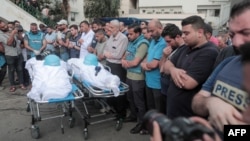As Israel fires back against the Hamas attack on its civilians, journalists and news websites have been caught in the crossfire.
International media watchdogs have reported that several journalists have been killed in Gaza since Saturday, when Hamas launched its assault on Israel. Other reporters are injured or listed as missing.
The militant group Hamas, which has ruled the Gaza Strip since 2007, invaded southern Israel on Saturday as part of an ambush that included the killings and kidnappings of civilians. Israel's military said the death toll has surpassed 1,000.
Israel responded to the killings and kidnappings, declaring war and placing Gaza and its population of 2.3 million people under siege. Authorities in the Palestinian territories said at least 560 people in Gaza have been killed.
Journalists killed while working
Among the media casualties is freelance photojournalist Mohammad Al-Salhi. News organizations say he was shot dead while covering military operations at the border east of the Palestinian refugee camp Bureij.
The Committee to Protect Journalists also reported that journalists Ibrahim Mohammad Lafi of the Palestinian news agency Ain Media and Mohammad Jarghoun were killed while reporting in Gaza.
"We call on all sides to remember that journalists are civilians and should not be targeted. Accurate reporting is critical during times of crisis and the media has a vital role to play in bringing news from Gaza and Israel to the world," CPJ's Middle East program coordinator Sherif Mansour said in a statement.
Meanwhile, the International Federation of Journalists has reported that journalists Said al-Taweel, Mohammed Sobboh and Hisham Nawajhah were killed by an Israeli airstrike that hit a residential building in Gaza City.
"Media workers in areas of armed conflict must be treated and protected as civilians and allowed to perform their work without interference," IFJ General Secretary Anthony Bellanger said in a statement. "There is intense and deeply concerned interest in this conflict all round the world, but people will only be able to understand what is really going on if journalists are allowed to do their work."
Media organizations targeted
Buildings housing media organizations based in the Palestinian territories have also been damaged in airstrikes, and in Israel, the English-language Jerusalem Post has been hit with cyberattacks.
"We've been targeted by a succession of devastating cyberattacks since the warfare started yesterday morning," the newspaper's editor-in-chief Avi Mayer told the Daily Beast. "We've been trying to deal with them, but they've taken us down several times."
Meanwhile, the social media platform X, formerly known as Twitter, has been criticized for a surge in disinformation spread on it, according to the news website Wired.
Wired identified video game footage passed off as Hamas attacks, a 3-year-old video from the Syrian civil war made to look like it was taken this weekend, and images of fireworks in Algeria being shared as Israeli strikes on Hamas.
Experts have said they believe the disinformation is a result of changes that X owner Elon Musk has made to the platform, including firing trust and safety staffers and an algorithm that promotes users who pay $8 per month for a premium subscription.
Musk had directed followers to two sites that analysts say are known for sharing disinformation. The X owner later deleted those posts and tweeted to users that they should "try to stay as close to the truth as possible."




